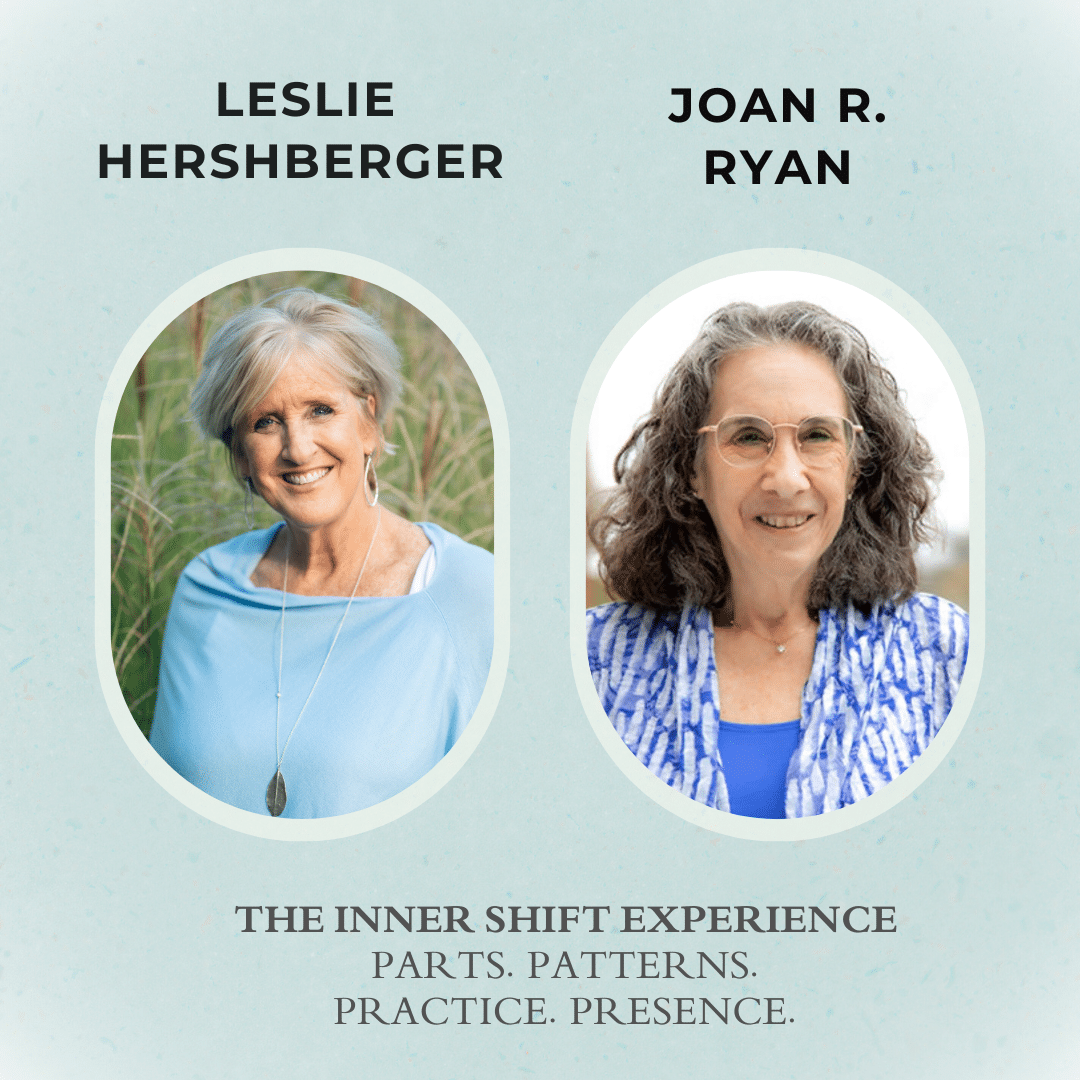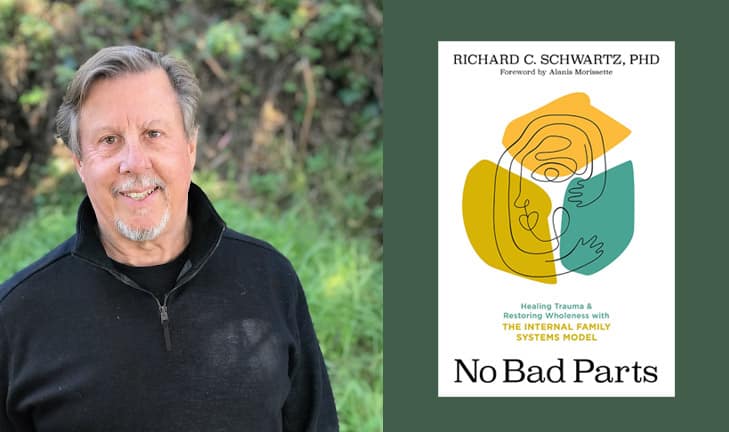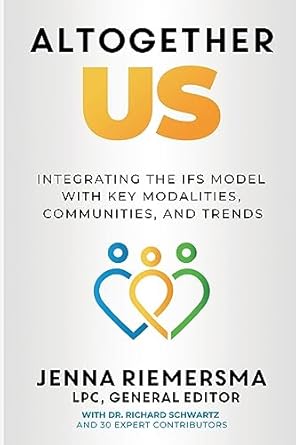
THE INNER SHIFT EXPERIENCE
A 3-Day Enneagram and IFS In-Person Intensive in Cincinnati Feb 19–22, 2026 | Cincinnati, OH
Bringing together Enneagram + IFS + Contemplative Presence
The Inner Shift is a 3-day Enneagram and Internal Family Systems (IFS) immersive designed to move you from Enneagram and IFS concepts into lived transformation in all 3 Centers: Head, Heart, Body/Moving.
You’ll experience presence, practice and integration in a grounded, supportive space.
Facilitated by Leslie Hershberger and Joan Ryan JD, master Enneagram teachers and IFS practitioners with over 50 years of combined experience, you’ll be guided through somatic practices, parts work, and real-time group process that create grounded presence, clarity and practice-focused change.
We are asking that participants apply to the retreat. Why?
This is a guided space for presence, practice and real inner movement.
Completing this application helps us to understand your experience with inner work in the Enneagram and/or in IFS and/or Meditation or Contemplative Practice.
While we provide Enneagram prep work for people new to the Enneagram and IFS prep work for those new to the IFS, space is intentionally limited to ensure each participant has the opportunity for meaningful engagement.
Despite being a new integration, this is not an introductory intensive.
A frequently asked question has been: Do I have to be a counselor, therapist or spiritual director to participate?
Not at all! You may be a parent, a partner, a friend or someone who wants to live more consciously in the world and the field of relationships.
Your level of intention and experience with one of these modalities is what matters most.
Early bird pricing is now available until November 30 and you can make a $200 deposit to secure your price before it increases.
About Joan Ryan, my friend, colleague and Inner Shift Co-Teacher
Joan Ryan is an internationally recognized Enneagram expert whose Enneagram work is grounded firmly within the Narrative Enneagram methods.
When I certified in the Narrative Enneagram, Joan was one of my teachers. With time, we became friends and colleagues with enormous respect for one another.
Joan had the distinct honor of being mentored directly by Narrative Enneagram founders, Helen Palmer and the late Dr. David Daniels. I can hear their level of precision in her teaching and insight. This is the beauty in being trained in a lineage.
She has worked as a senior leadership coach and trainer with Senior Management in international law firms, medical settings, major corporations and nonprofit organizations including major work for USAID in the Global Health field.
Joan is the co-creator and co-lead teacher with Santikaro for Enneagram Thailand (now Thai Enneagram Association) a teaching and learning community established in 2003 in Bangkok, which continues to grow and thrive.
She is a Founding Fellow, Institute of Coaching, affiliate of McLean Hospital of Harvard Medical School.
Joan holds a J.D. from New England Law, and an A.B. from Washington University in St. Louis.

You know the Enneagram, but what is Internal Family Systems (IFS)?
And why are so many finding it so powerful in Enneagram and spiritual work?
IFS was founded by Richard Schwartz PhD, who was originally trained as a family systems therapist. He worked with adolescents struggling with eating disorders (particularly bulimia and anorexia).
He noticed that even when he worked with the client’s family (the external family), many clients continued to relapse.
This made him wonder: “What is happening inside the client’s own INNER world?”
This is congruent with Leslie’s work with contemplation and mindfulness. The more we practice, the more we encounter the many parts inside of ourselves.
The Enneagram points us to the habitual attentional styles of our pattern: What do we notice? What do we avoid?
IFS breaks these patterns into parts and offers us a deceptively simply METHOD to work with them by bringing them into consciousness.
WE CONTAIN MULTITUDES
As Schwartz listened more closely to clients, he began to hear them describe their inner life in terms of “parts.”
• Some parts wanted to binge or starve.
• Others tried to protect them from pain.
• Others criticized them harshly. (Enneagram Ones aren’t the only ones with an Inner Critic).
Instead of dismissing this language as metaphor, Schwartz took it seriously — treating these parts as if they were real subpersonalities with intentions, fears, and roles.
DISCOVERY OF “SELF ENERGY”
Through this exploration, Schwartz noticed something remarkable which you may have see in Narrative Enneagram panels:
• Beneath all the warring parts, clients sometimes touched into a core Presence — calm, compassionate, confident, curious.
• He called this essence the Self.
• Healing happened when the Self could form a relationship with the parts, rather than the therapist trying to manage them from outside.
This has some intersections with contemplative practice. Beneath our neurotic self talk, we begin to encounter a higher Self energy, deeply connected with what some call God, Reality, Universal consciousness.
THE DEVELOPMENT OF IFS
I didn’t set out to invent a therapy. My clients taught me about their parts and I just listened. Richard Schwartz PhD
It’s an antidote to the modern habit—especially online—of turning people into diagnoses. Where some see pathology, Schwartz saw parts. Where some impose categories, he offered curiosity.
Where some collapse people into their worst behaviors, he listened for the deeper system trying to be seen.
This led me to reflect on the Enneagram. At times, we as Enneagram teachers have fallen into the same trap—using type labels the way others use diagnoses. We eventually realize that whether you’re pathologizing someone with clinical language or flattening them into a single Enneagram type, it’s still a limiting way to work with humans.
This is why I’ve always been drawn to Enneagram panels. They re-humanize the work. When real people speak from within their own lived experience—held by receptive, fair witnesses—something deeper than the type structure emerges. We begin to sense the person beneath the pattern, the presence beneath the personality.
I was drawn to Richard Schwartz who has been outspoken about how much of traditional psychotherapy tends to pathologize people, and that concern was a major reason he shaped IFS the way he did.
When I discovered he found IFS through work with people with eating disorders, I was encouraged as I know that anorexia and bulemia are notoriously difficult to treat.
When Schwartz was working with young women with eating disorders in the 1980s, he noticed that:
• Standard models labeled their behaviors as symptoms or disorders.
• Their inner voices (e.g., the “critical” part, the “binge” part) were seen as irrational, destructive, or maladaptive.
But when he actually listened to those voices, he heard that each one carried an intention to help — even if in a distorted way. For example, a bingeing part might be trying to numb unbearable pain; a perfectionist part might be trying to keep someone safe from rejection.
Shift from “pathology” to “protection”
“Psychology has done a great disservice by convincing people that their inner experiences are pathological. When you listen to parts, you discover they are trying to help. They are not disorders — they are protectors.” Richard Schwartz PhD
Rather than labeling these parts as pathological, Schwartz reframed them as protectors.
• They weren’t sick or evil — they were working overtime, often stuck in extreme roles because of trauma or unmet needs.
• In his words, “There are no bad parts.”
This was a radical departure from mainstream psychotherapy at the time, which often emphasized diagnosing and treating “disorders.”
The Self as innate health
Another way Schwartz resisted pathologizing was through the discovery of the Self — the compassionate, calm, clear presence at the core of everyone.
• For Schwartz, Self is never damaged.
• No matter how extreme someone’s parts have become, the Self remains intact.
• Therapy is about restoring relationship between Self and parts, not fixing a broken person.
Schwartz developed IFS because:
• Traditional family systems therapy wasn’t enough to address inner conflict.
• He realized people carry their own “internal families” of parts that interact like members of an external family.
• By mapping those relationships and helping clients access the Self, profound healing and integration could occur.

IFS + THE ENNEAGRAM
BOOK AND THE PODCAST
The Enneagram gave me awareness of our patterns. IFS gave me a method in working with them. Joan Ryan JD
When JOAN RYAN, an Enneagram 9, first encountered IFS, she found many correlates in her 25+ years of teaching and working with the Enneagram.
Joan was struck by how “parts work” gave her a METHOD to work with some of the most tenacious habits of her type structure which so instinctively goes stubborn and numbs out when activated.
Joan underwent intensive IFS training and then met Tammy Sollenberger, creator of the popular, The One Inside podcast and a licensed clinical mental health counselor and an Internal Family Systems (IFS) Certified Supervisor who also saw the correlates between the Enneagram, therapy and IFS.
Tammy and Joan are co-contributors to the new reference work “Altogether Us: Integrating the IFS Model with Key Modalities, Communities, and Trends.”
Their chapter is titled, IFS and the Enneagram: Connecting to Parts Using the Enneagram Map.
Joan and Tammy’s contribution focuses on the integration of IFS and they have taught courses and have recorded a series of podcasts to detail this work.
Many of you know the Enneagram well. If you feel the need, Joan is offering a primer to IFS to help you prepare for the February intensive.
Leslie will be offering an Enneagram primer to IFS practitioners who are new to the Enneagram.
